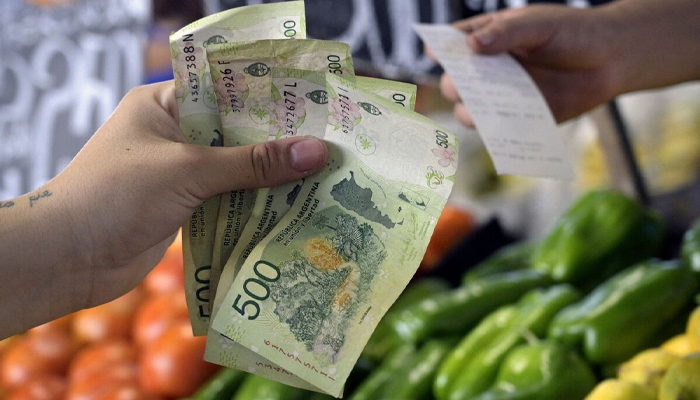Inflation hits 210pc in Argentina after peso devaluation
Buenos Aires: In the lead-up to Christmas, Rosa Álvarez would expect the Buenos Aires delicatessen where she works to be flooded with orders for the staples of festive celebrations in Argentina, from charcuterie boards to cow tongue and beef roulade.
But with prices rising at their fastest rate since the country’s 1990 hyperinflation crisis, they have had no requests. “I get it, because in my house too I’ve held back on food,” said the 39-year-old, noting that the price of products such as sliced ham had more than doubled in just two months.
“I have to pay for petrol, electricity and diapers first, which are also going up . . . Christmas is going to be more austere this year.” Argentines have grappled with rapid price rises all year, with annual inflation topping 160 percent last month, largely due to expansive money printing under the recently departed left-leaning Peronist government.
That was before the country’s new libertarian president Javier Milei launched his “shock therapy” economic plan, starting with a 54 percent devaluation of the peso’s official exchange rate to 800 pesos per dollar.
The move has unleashed even greater price rises in December, with economics consultancy Ecolatina projecting that month-on-month inflation will be around 25 percent — up from 12.8 percent in November — which would take the annual rate to 210.3 percent.
“Several days this week we have had to update prices twice a day, because our suppliers keep sending us new price lists,” Álvarez said. “This is Argentina, so I’m used to inflation, but I’ve never experienced anything like this.”
The prices of staples such as rice, bread, pasta and milk jumped by up to 50 per cent in a single week after the devaluation, according to a survey by newspaper Infobae.
Part of what’s driving the rapid increases, analysts say, is Milei’s push to readjust Argentina’s deeply distorted relative prices. Under previous governments, subsidies, price controls and economic restrictions have restrained the prices of key domestically produced goods such as oil and beef, as well as services such as public transport, healthcare and the internet, keeping increases well below inflation.
Petrol prices have risen almost 80 per cent since the start of December due to the devaluation and the expiry of price-fixing agreements, reaching about 620 pesos — the equivalent of 66 cents at the black market exchange rate for dollars, which is closely watched because few Argentines can access the official rate to convert pesos.
Beef, the centrepiece of many Christmas dishes and New Year’s Eve barbecues, has risen 40 percent to roughly 6,000 pesos per kilo ($6.40) in Buenos Aires’ butchers. However, Milei’s government last week struck a deal with major supermarket chains to fix the price at 4,900 pesos per kilo until December 31.
Most Argentines’ salaries have not been keeping pace with the increases, experts say. While the average salary for registered workers stood at 420,700 pesos in October, that figure does not reflect the roughly half of workers in the informal economy, who tend to be paid much less and are less able to negotiate regular hikes. Argentina’s minimum wage for regulated workers in December is 156,000 pesos.
“I keep working the same amount, but I have less and less money,” said Gustavo Gómez, a 61-year-old electrical goods vendor, who said his family would have to sacrifice some meat dishes this Christmas, including Argentine favourite Vitel Toné, which he makes with beef tongue topped with a tuna sauce.
“We’re at a point where you don’t know the real value of anything, because merchants are raising their prices so constantly.”
Analysts say there is a risk that Argentina could tip into an even faster inflationary spiral in the coming months if wages end up rising to match the price adjustments. But Santiago Manoukian, head of research at consultancy Ecolatina, said an impending recession was likely to prevent that.
“We’re anticipating a drop in demand for consumption, because families will be forced to prioritise paying fixed costs such as energy bills, which will put a break on [retail] price rises,” he said.
Household consumption fell by 6.9 percent in November compared to October on seasonally adjusted terms, according to a report from Argentina’s Chamber of Commerce and Services.
JPMorgan Chase has predicted a rapid drop in economic activity in the country, including a 3 percent contraction in 2024. Inflation was likely to remain high for the first half of the year, said Lucila Barbeito, an Argentina-based analyst.
“Assuming that [the government’s] stabilisation program proves successful, we project that we should see a single-digit monthly inflation rate in the second half of the year.”
Four in 10 Argentines are already living in poverty, and campaign groups have warned that figure will rise as inflation leaves more people unable to afford basic goods.
Eduardo Alejandro Solimo, 57, a butcher who has raised his prices by roughly 50 percent this month, said a painful year for Argentines was inevitable.
“People need to withstand this period until wages and prices level out, because our prices weren’t sustainable,” he said. “We needed a change to improve things in the long run.”
-
 Demi Lovato Leaves Fans Disappointed With Unexpected Announcement
Demi Lovato Leaves Fans Disappointed With Unexpected Announcement -
 Pacers Vs Knicks Overtime Thriller Ends In Heartbreak For New York
Pacers Vs Knicks Overtime Thriller Ends In Heartbreak For New York -
 Who Owns The Ambassador Bridge? New Report Links Owner Matthew Moroun To Trump’s Threat
Who Owns The Ambassador Bridge? New Report Links Owner Matthew Moroun To Trump’s Threat -
 ICE Detention Center Plan Sparks Controversy In Maryland As Lawmakers Push Back
ICE Detention Center Plan Sparks Controversy In Maryland As Lawmakers Push Back -
 Blood Pressure Medication Recalled After Wrong Tablets Found In Bottles
Blood Pressure Medication Recalled After Wrong Tablets Found In Bottles -
 Why Ariana Grande Wants A 'tiny Mouse' To Play Her In Biopic?
Why Ariana Grande Wants A 'tiny Mouse' To Play Her In Biopic? -
 Wind Chill Returns With Brutal Cold As Polar Vortex Stalls Over Canada
Wind Chill Returns With Brutal Cold As Polar Vortex Stalls Over Canada -
 Princess Beatrice, Eugenie ‘do Not Want To Be Seen In Public’ Because Of Dad
Princess Beatrice, Eugenie ‘do Not Want To Be Seen In Public’ Because Of Dad -
 Costco $20 Rule Explained As Employee Pay Climbs Across North America
Costco $20 Rule Explained As Employee Pay Climbs Across North America -
 Strange Incident Happened At Nancy Guthrie's Home On Abduction's 10th Day
Strange Incident Happened At Nancy Guthrie's Home On Abduction's 10th Day -
 Tumbler Ridge School Lockdown Underway As RCMP Investigate School Shooting
Tumbler Ridge School Lockdown Underway As RCMP Investigate School Shooting -
 Royal Family Knows There Can Be ‘no More Glossing’ Of Andrew Downfall
Royal Family Knows There Can Be ‘no More Glossing’ Of Andrew Downfall -
 Britney Spears Quietly Parts Ways With Her Music Catalog: Report
Britney Spears Quietly Parts Ways With Her Music Catalog: Report -
 Princess Diana Bodyguard Suspected ‘she Could Die’: Here’s How
Princess Diana Bodyguard Suspected ‘she Could Die’: Here’s How -
 Teddi Mellencamp Marks Huge Milestone With Emotional Message Amid Cancer
Teddi Mellencamp Marks Huge Milestone With Emotional Message Amid Cancer -
 Shamed Andrew To ‘kiss And Tell’ After Dip In Popularity
Shamed Andrew To ‘kiss And Tell’ After Dip In Popularity




